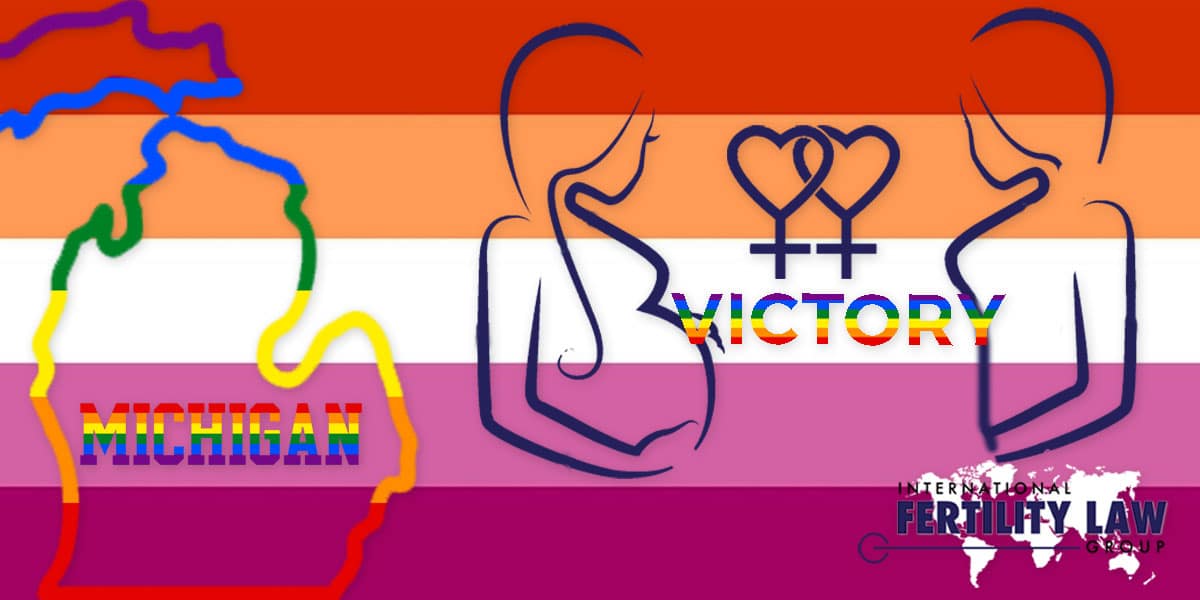
22 Jun 2021 Michigan Court Reverses Ruling Deeming Lesbian Mom A ‘Surrogate’
The Michigan Court of Appeals recently ruled that lesbian mom LaNesha Matthews, who gave birth to twin daughters created by “reciprocal IVF” with her then partner Kyresha LeFever some 10 years ago, is a legal parent to the girls.
The April 2021 decision overturned an earlier Michigan court ruling that stripped Matthews of her parental rights, stating that she was a “surrogate” rather than the girls’ legal mother, and granting full custody to LeFever.
Matthews and LeFever began a committed romantic relationship in 2011 and decided to have a child together, as reported in Above the Law. At that time, prior to the 2015 U.S. Supreme Court legalizing same-sex marriage, they were unable to legally marry. They also knew that Michigan law would not allow both women’s names on their babies’ birth certificate, so they planned for Matthews to give birth in Ohio, where they believed both their names would be allowed.
Working through a fertility clinic, LeFever’s eggs were harvested and fertilized using donor sperm. The resulting viable embryos were successfully implanted in Matthews’ uterus. But the plan to give birth in Ohio fell through; the twins came two months early and were born in Michigan. Matthews, as the birthing mother, was listed on the babies’ birth certificates, but LeFever was not. However, the babies were given LeFever’s last name.
The couple raised the babies together until 2014, when they split, but continued to co-parent from separate homes until 2016. At that time, LeFever assumed primary parent duties due to Matthews’ health issues.
In 2018, LeFever filed for custody. Following a six-day trial, the judge ruled in LeFever’s favor, claiming that Matthews, under Michigan’s Surrogate Parenting Act, was a “surrogate” rather than the twins’ mother. The judge ruled that Matthews, as the surrogate, had only third-party standing in the case and had to show clear and convincing evidence that it was the twins’ best interest for her to have custody. He ordered Matthews’ name removed from the twins’ birth certificates and granted full custody to LeFever.
Michigan Appeals Court Rules ‘Natural Parent’ Does Not Mean Genetic Relationship
In reversing that decision, the Michigan appellate court ruled that the lower court erred in deeming Matthews a surrogate under Michigan law and in its contention that a “natural parent” must be genetically related to the child. Matthews’ case drew support from the National Center for Lesbian Rights (NCLR), which, along with local trial counsel Regina Jemison, represented her on appeal, as well as from the ACLU, ACLU of Michigan, Center for Genetics and Society, and Pro-Choice Alliance for Responsible Research.
As we have written before, Michigan surrogacy and parentage laws are sorely out-of-date; in fact, with passage of new legislation in New York, New Jersey and District of Columbia, Michigan and Louisiana are the only remaining states in the U.S. with an absolute ban on compensated surrogacy. Although Michiganders continue to participate in altruistic surrogacy arrangements in which the surrogate is uncompensated, the fact that surrogacy contracts are not legally enforceable and the lack of clarity in the law leads to too many quixotic and inappropriate outcomes.
Michigan Couple Forced to Adopt Biologically Related Babies Born by Surrogate
We followed another such Michigan case that also made international headlines. In January 2021, a Kent County, Michigan, court refused to recognize the parental rights of Tammy and Jordan Meyers, a married, heterosexual couple who had twins via altruistic surrogacy after Tammy’s cancer treatment rendered her unable to carry a pregnancy to term. Despite the fact that both parents are genetically related to the babies—Tammy’s eggs and Jordan’s sperm were used to create the embryos that became their twins—the court ruled that the surrogate and her husband are the twins’ legal parents.
In order to establish their parentage, the Meyers are being forced to adopt their own children—with the accompanying legal expense, home inspections, screenings and criminal background checks that come with any standard adoption procedure. This despite the fact that they are already parents to a healthy, happy 8-year-old daughter, conceived and born before Tammy was diagnosed with cancer.
As we always advise our clients, despite standardization efforts from the legal profession, the laws governing assisted reproduction such as egg and sperm donation, IVF, surrogacy and parentage vary widely from state to U.S. state and from country to country. More and more people use assisted reproduction to build families every year, while many courts have not evolved to accommodate non-traditional families. The divide between miraculous new technologies and rigid, outdated law often creates big gaps, like the ones Matthews and the Meyerses fell through in Michigan. That’s why it is essential that intended parents retain an attorney who is experienced in fertility law and familiar with the laws in the jurisdiction where the baby will be born and where the family will ultimately reside.
For more information about assisted reproduction and the laws in your state, contact our IFLG team of experienced assisted reproductive technology attorneys and paralegals.

















